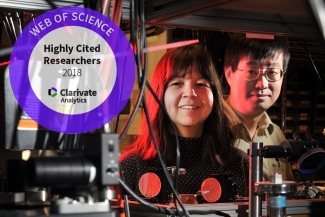JILA Fellows Jun Ye and Deborah Jin (1968 to 2016) have been named Highly Cited Researchers for 2018 by Clarivate Analytics.
The list of Highly Cited Researchers, published annually since 2014, recognizes scientists across the world who have demonstrated significant influence through publication of multiple highly cited papers during the last decade.
Clarivate’s list of Highly Cited Researchers is determined by production of multiple papers whose citations rank in the top 1% in Web of Science. The 2018 list surveys papers published from 2006 through 2016, across 21 fields of science and social science. Approximately 6,000 researchers were named Highly Cited Researchers in 2018. Ye and Jin are among 211 physicists across the world included in the list.
Although Debbie Jin passed away in September 2016, she remains on the list covering publications from the period 2006 through 2016, reflecting her enormous impact on science even during her courageous battle with cancer. Jin and Ye were close collaborators and friends, jointly publishing many of the key scientific papers on the production, characterization and applications of quantum degenerate gases of polar molecules.
“It is humbling to see the impact that both Jun and Debbie continue to have on worldwide physics research, even two years after Debbie’s passing,” said Thomas O’Brian, a JILA Fellow and chief of the Time and Frequency Division at the National Institute of Standards and Technology (NIST).
The Ye group conducts a particularly broad and deep program in quantum science, including ultracold lattices of strontium atoms for world-leading atomic clocks and quantum many-body research, ultrastable lasers and femtosecond laser frequency combs, quantum degenerate molecular gases, and precision measurements.
Learn more about the methodology for determining top citations and access the full list of 2018 Highly Cited Researchers on the Clarivate Analytics website.



 The Physics Frontiers Centers (PFC) program supports university-based centers and institutes where the collective efforts of a larger group of individuals can enable transformational advances in the most promising research areas. The program is designed to foster major breakthroughs at the intellectual frontiers of physics by providing needed resources such as combinations of talents, skills, disciplines, and/or specialized infrastructure, not usually available to individual investigators or small groups, in an environment in which the collective efforts of the larger group can be shown to be seminal to promoting significant progress in the science and the education of students. PFCs also include creative, substantive activities aimed at enhancing education, broadening participation of traditionally underrepresented groups, and outreach to the scientific community and general public.
The Physics Frontiers Centers (PFC) program supports university-based centers and institutes where the collective efforts of a larger group of individuals can enable transformational advances in the most promising research areas. The program is designed to foster major breakthroughs at the intellectual frontiers of physics by providing needed resources such as combinations of talents, skills, disciplines, and/or specialized infrastructure, not usually available to individual investigators or small groups, in an environment in which the collective efforts of the larger group can be shown to be seminal to promoting significant progress in the science and the education of students. PFCs also include creative, substantive activities aimed at enhancing education, broadening participation of traditionally underrepresented groups, and outreach to the scientific community and general public.